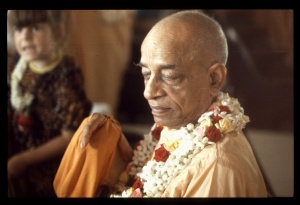CC Madhya 13.23 (1975): Difference between revisions
(Vanibot #0027: CCMirror - Mirror CC's 1996 edition to form a basis for 1975) |
(Vanibot #0020: VersionCompareLinker - added a link to the Version Compare feature) |
||
| Line 2: | Line 2: | ||
<div style="float:left">'''[[Sri Caitanya-caritamrta (1975)|Śrī Caitanya-caritāmṛta (1975)]] - [[CC Madhya (1975)|Madhya-līlā]] - [[CC Madhya 13 (1975)|Chapter 13: The Ecstatic Dancing of the Lord at Ratha-yātrā]]'''</div> | <div style="float:left">'''[[Sri Caitanya-caritamrta (1975)|Śrī Caitanya-caritāmṛta (1975)]] - [[CC Madhya (1975)|Madhya-līlā]] - [[CC Madhya 13 (1975)|Chapter 13: The Ecstatic Dancing of the Lord at Ratha-yātrā]]'''</div> | ||
<div style="float:right">[[File:Go-previous.png|link=CC Madhya 13.22 (1975)|Madhya-līlā 13.22]] '''[[CC Madhya 13.22 (1975)|Madhya-līlā 13.22]] - [[CC Madhya 13.24 (1975)|Madhya-līlā 13.24]]''' [[File:Go-next.png|link=CC Madhya 13.24 (1975)|Madhya-līlā 13.24]]</div> | <div style="float:right">[[File:Go-previous.png|link=CC Madhya 13.22 (1975)|Madhya-līlā 13.22]] '''[[CC Madhya 13.22 (1975)|Madhya-līlā 13.22]] - [[CC Madhya 13.24 (1975)|Madhya-līlā 13.24]]''' [[File:Go-next.png|link=CC Madhya 13.24 (1975)|Madhya-līlā 13.24]]</div> | ||
{{CompareVersions|CC|Madhya 13.23|CC 1975|CC 1996}} | |||
{{RandomImage}} | {{RandomImage}} | ||
==== TEXT 23 ==== | ==== TEXT 23 ==== | ||
Latest revision as of 07:47, 27 January 2020
Śrī Caitanya-caritāmṛta (1975) - Madhya-līlā - Chapter 13: The Ecstatic Dancing of the Lord at Ratha-yātrā

His Divine Grace
A.C. Bhaktivedanta Swami Prabhupada
A.C. Bhaktivedanta Swami Prabhupada
TEXT 23
- pañca-daśa dina īśvara mahā-lakṣmī lañā
- tāṅra saṅge krīḍā kaila nibhṛte vasiyā
SYNONYMS
pañca-daśa dina—fifteen days; īśvara—the Lord; mahā-lakṣmī—the supreme goddess of fortune; lañā—with; tāṅra saṅge—in her company; krīḍā—enjoyment; kaila—performed; nibhṛte—in a solitary place; vasiyā—sitting.
TRANSLATION
For fifteen days the Lord had remained in a secluded place with the supreme goddess of fortune and had performed His pastimes with her.
PURPORT
The fifteen-day period of anavasara is also called nibhṛta, in honor of the solitary place where the supreme goddess of fortune lives. After living there a fortnight, Lord Jagannātha took permission from the goddess of fortune to leave.